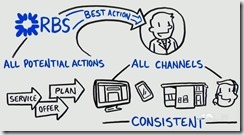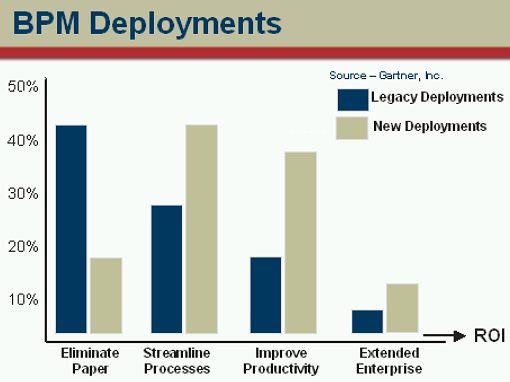After the futurist view of Brian Solis, we had a bit more down-to-earth views from two Pega customers, starting with Bob Noddin from AIG Japan on how to turn information that they have about customers into an opportunity to do something expected and good. Insurance companies have the potential to help their customers to reduce risk, and therefore insurance claims: they have a lot of information about general trends in risk reduction (e.g., tell an older customer that if they have a dog and walk it regularly, they will stay healthier and live longer) as well as customer-specific actions (e.g., suggest a different route for someone to drive to work in order to reduce likelihood of accident, based on where they live and work, and the accident rates for the roads in between). This is not a zero-sum game: fewer claims is good for both AIG and the customers. Noddin was obviously paying close attention to Solis, since he wove elements of that into his presentation in how they are engaging customers in the way that the customer chooses, and have reworked their customer experience – and their employee and agent experience – with that in mind.
Between the two customers, we heard from Rob Walker, VP of Decision Management and Analytics at Pega, about the always-on customer brain and strategies for engaging with them:
- Know your customer: collect and analyze their data, then put it in the context of their entire customer journey
- Reach your customer: break down the silos between different channels, and also between inbound and outbound communications, to form a single coherent conversation
- Delight your customer: target their needs and wants based on what you know about them, using the channels through which you know that they can be reached.
He discussed how to use Pega solutions to achieve this through data, analytics and decisioning; obviously, the principles are universal.
 The second customer on stage was Christian Nelissen from Royal Bank of Scotland, who I also saw yesterday (but didn’t blog about) on the big data panel. RBS has a good culture of knowing their customer from their roots as a smaller, more localized bank: instead of the branch manager knowing every customer personally, however, they now rely on data about customers to create 1:1 personalize experiences based on predictive and adaptive analytics in the ever-changing context of the customer. He talked about the three pillars of their approach:
The second customer on stage was Christian Nelissen from Royal Bank of Scotland, who I also saw yesterday (but didn’t blog about) on the big data panel. RBS has a good culture of knowing their customer from their roots as a smaller, more localized bank: instead of the branch manager knowing every customer personally, however, they now rely on data about customers to create 1:1 personalize experiences based on predictive and adaptive analytics in the ever-changing context of the customer. He talked about the three pillars of their approach:
- It’s about the conversation. If you focus on doing the right thing for the customer, not always explicit selling to them, you build the relationship for the long term.
- One customer, one bank. A customer may have products in different bank divisions, such as retail banking, credit cards and small business banking, and you need to be cognizant of their complete relationship with the bank and avoid internal turf wars.
- You can do a lot with a little. Data collection and analytics technologies have become increasingly cheaper, allowing you to start small and learn a lot before expanding your customer analytics program.
Alan Trefler closed out the keynote before sending us off to the rest of the day of breakout sessions. Next years, PegaWorld is in Las Vegas; not my favorite place, but I’ll be back for the quality of the presentations and interactions here.
These two keynotes this morning have been great to listen to, and also closely aligned with the future of work workshop that I’m doing at IRM BPM in London next week, as well as the session on changing incentives for knowledge workers. Always good when the planets align.

